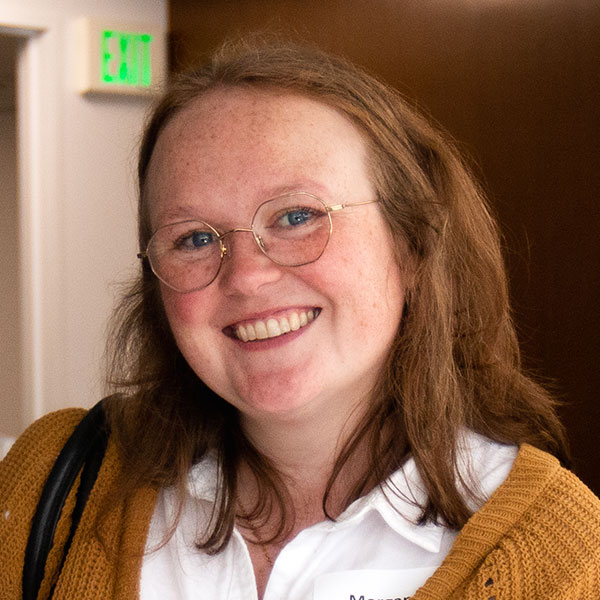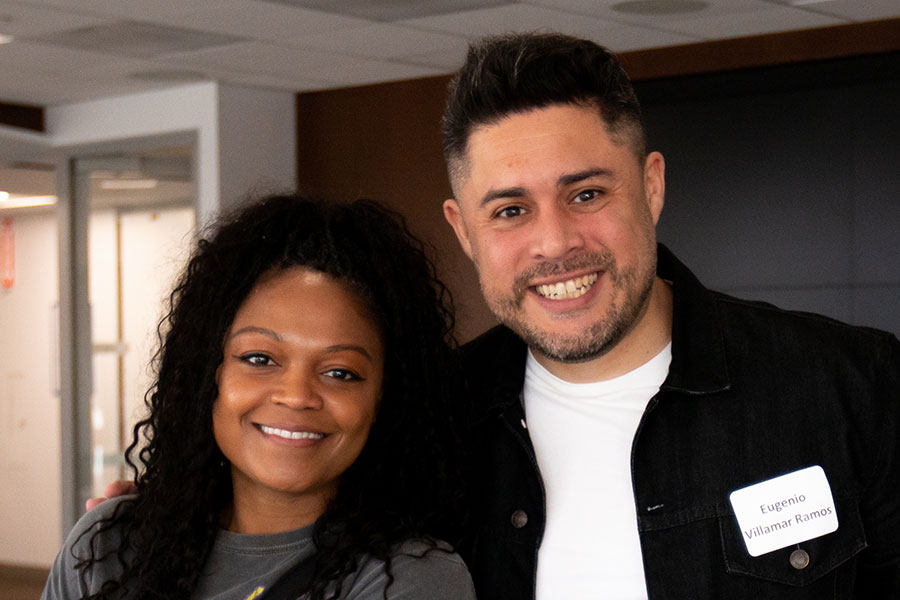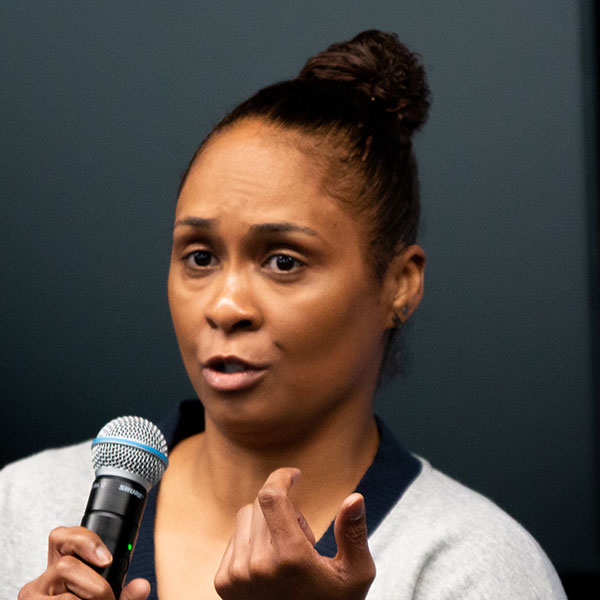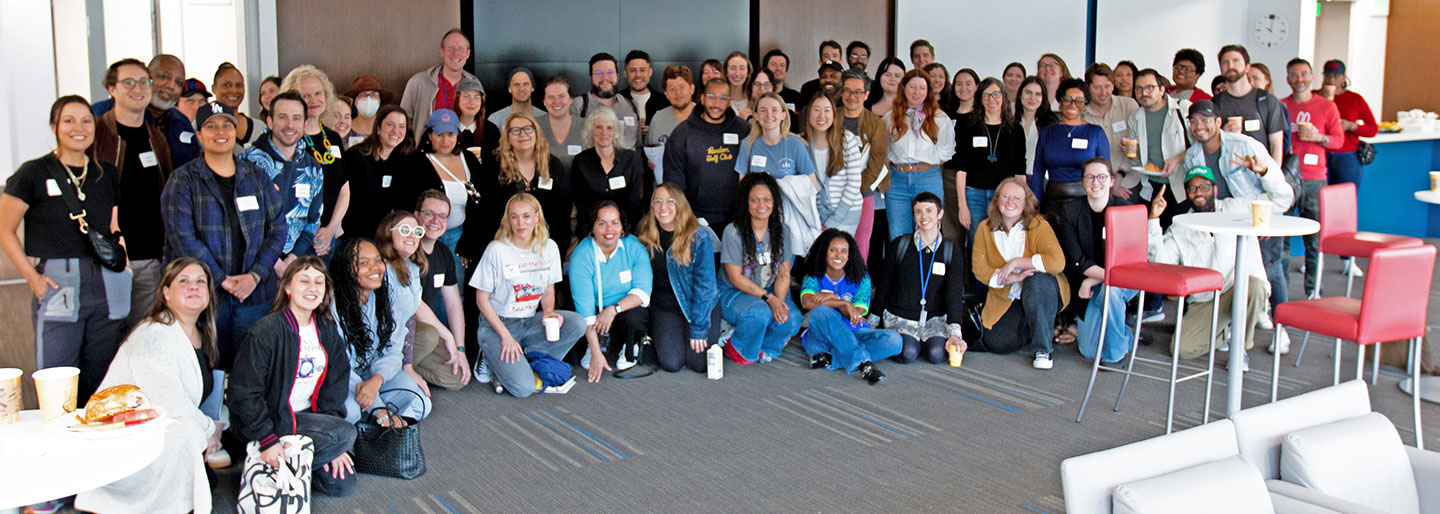As she kicked off the 2025 Screenwriter Bootcamp, WGAW Vice President Michele Mulroney reminded the room full of WGAW members—many of them emerging screenwriters—an important provision of the proceedings: “What’s said at Bootcamp, stays at Bootcamp.”
The rule mostly applied to writers refraining from taking any juicy stories to social media. Mulroney and fellow WGAW Board Members and event co-organizers Chris Hazzard and Maggie Levin fully expect the nearly 90 writers who attended the Bootcamp to learn from and apply the wisdom they hear to their own careers.
“The idea behind Bootcamp is simple: to bring together our emerging screenwriter members to get steeped in the basics of navigating a career in features,” said Mulroney.
In the process, they also get to connect with the community of screenwriters, said Hazard.
 First-time Screenwriters Bootcamp attendee Morgan Dameron. Photo by Moises Marquez.
First-time Screenwriters Bootcamp attendee Morgan Dameron. Photo by Moises Marquez.“One of the positives to come out of the 2023 strike, especially for screenwriters, was a connection with a lot of people. It’s very easy to lose sight of that when you’re off on your own, maybe dealing with a partner, but kind of siloed,” said Hazzard. “Events like this that bring that community back together especially people who are early in their career with the Guild, remind everyone that the Guild is such a resource.”
“I helped plan it,” Hazzard added, “but I’m excited to be here as someone who gets to listen as well.”
Interviewed by Written by during the pre-panel reception, Bootcamp attendee Morgan Dameron was excited for the event to get started. Having worked largely in feature adaptations, she recently wrote her first original spec and was looking forward to getting perspective on the differences between navigating the two genres.
“I’m also curious about the larger issues we’re facing in terms of the ongoing challenges that our industry is going through and how other people are weathering the storm,” Dameron, a five-year WGAW member said. “There’s always a lot of power in solidarity, so it’s important to just come together as a community.”
“Every now and then, someone has a golden nugget to give you about screenwriting, so it’s good to come and socialize with other writers,” added Eugenio Villamar Ramos, who became a WGAW member in 2025. “I feel like it’s back to school, and I love it. I’m enjoying the resources of the Guild.”
 Mika Frank and Eugenio Villamar Ramos attend the 2025 Screenwriters Bootcamp. Photo by Moises Marquez.
Mika Frank and Eugenio Villamar Ramos attend the 2025 Screenwriters Bootcamp. Photo by Moises Marquez.During the event, attendees mingled with other writers, received copies of the freshly-updated WGAW Screenwriters Handbook and heard a plug for the Guild’s Captains program. Then it was time to get down to the business of being a working screenwriter.
The first panel, Feature Writing 101, covered topics such as getting the most out of general meetings; the pros and cons of writing on spec, pitching for OWAs, and what to know about IP; how to be entrepreneurial and generate opportunities; and advice on how to optimize one’s writing process. The panelists included Kay Cannon, Alex Convery, Akela Cooper, Meg LeFauve, and Kemp Powers, with Mulroney serving as moderator.
For Panel #2, Navigating Relationships, John August moderated as panelists Eric Heisserer, Michael Kennedy, Adele Lim, John Whittington, and Kat Wood discussed establishing clear communications with producers; handling notes including free work requests; rewriting etiquette and the basics for managing reps.
A journalist and playwright before transitioning to work in film and TV, Feature Writing 101 panelist Powers said he frequently fields questions from aspiring screenwriters wondering how they can break into the business.

You pass on anything you have learned, any info that you have that you hope will be useful to other people in the business.
- Kemp Powers
“There has been an increased interest in screenwriting, so a lot of the questions I have gotten lately are kind of basic,” Powers said, “which is part of the reason why the Feature Writing 101 panel is really a good idea. If you line up 10 screenwriters in a room, you’re going to have 10 completely different stories. So you pass on anything you have learned, any info that you have that you hope will be useful to other people in the business. I’m just trying to pay it forward and be helpful.”
LeFauve said that emerging writers she speaks to are often hungry for tips about how to get representation, pitching, and writing on spec. Echoing the importance of uplifting the community of writers, LeFauve co-hosts The Screenwriting Life podcast with Lauren McKenna.
“I’m doing everything I can to help emerging writers—and any writer honestly—get better at our craft, but also have community and support,” LeFauve said, “because being an artist is challenging, but especially now given the contraction, we really need to support each other.”
The Feature Writing 101 panel opened with a discussion of the dos and don’t’s for general meetings. Panelists emphasized the importance of making a favorable impression and of having a subject you feel passionate about ready to discuss. Cannon recalls telling everyone she met about her interest in a story about a cappella groups.
 Akela Cooper recounts how a general meeting turned into her writing the screenplay for M3gan. Photo by Moises Marquez.
Akela Cooper recounts how a general meeting turned into her writing the screenplay for M3gan. Photo by Moises Marquez.“You are the entertainer at the general. You are there to entertain them, so find something you can talk about endlessly, that you’re really knowledgeable and passionate about,” said Cannon who wrote Pitch Perfect and its sequels, “because what they’re seeing is you being passionate and having an idea about something, it always segues into an idea that you want to pitch. I would tell anyone who would listen, ‘I’ve got this idea to write an a cappella movie. I would tell agents, friends and co-workers. I sort of willed it into being.”
Cooper recommended staying in touch with executives you might spark with during general meetings, getting contact information and asking if you can bring them future ideas. She recounted her experience with a group of executives who shared her interest in genre and horror. They had read a couple of her spec scripts which they didn’t want to produce, but they brought her in for a meeting to “shoot the shit about all the horror movies we love.”
“They were like, ‘We have this idea. We want to do an updated version of Child’s Play that involves AI and is not supernatural. Do you want to take a crack at that?’” said Cooper of the idea that would become the film M3gan. “Hell, yeah, I want to take a crack at that, and the sequel comes out in two months.”
When the subject turned to the pros and cons of spec scripts, Convery acknowledged that the ultimate con is the fact that you’re not getting paid when you’re writing the script. At the same time, he said, specs scripts are invariably written when a writer is passionate about an idea.
“The goal here is to get stuff made that you’re proud of, and to me, a spec is the surest way to get your voice out there,” Convery said. “When it comes to the stuff that really makes you burn inside, that’s where your best writing is going to come from.”






